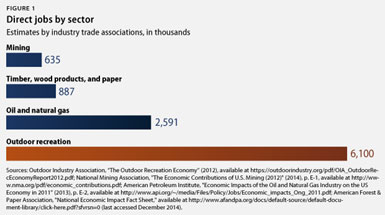Although the outdoor recreation industry supports 6.1 million jobs and generates $621 billion a year, I was surprised to learn it’s not included in US gross domestic product (GDP) calculations.
Perhaps we would value our protected lands and water more if they were included as part of the economy! Outdoor recreation – which depends on healthy ecosystems and clean water – employs more people than oil, natural gas, and mining combined, according to the Outdoor Industry Association.

9 in 10 Westerners see national parks, national forests, wildlife refuges, and other public lands as essential to the economic prosperity of their state (Colorado College opinion research 2013) and a growing body of research shows that proximity to parks, trails, and the outdoors is among the most prominent factors that businesses and workers consider when choosing where to locate, says Center for American Progress (CAP) in an issue brief on this subject.
Communities with protected public lands have a competitive advantage in attracting highly skilled people like engineers, architects, software developers, doctors, lawyers and researchers, says economist Ray Rasker, author of a 2012 Headwaters Economics study. Studies show correlations between proximity to open space and lower crime rates, higher quality schools and improved health.
In 1993, President Clinton said he would prioritize development of a "Green GDP" that "would incorporate changes in the natural environment into calculations of national income and wealth." The Bureau of Economic Analysis began the work, but the following year Congress stopped the effort.
The Obama administration should direct the agency to return to that work with support from the Bureau of Labor Statistics, Bureau of the Census, and natural resource agencies, recommends CAP. There’s ample information available, such as travel and tourism revenue and employment, manufacture and sale of gear and apparel, and on activities such as fishing and hunting.
Until then, policymakers at the federal, state, and local levels will continue making decisions – like fracking, oil drilling, mining, logging – that affect our public lands and waterways without understanding how important they are.
Today, as part of the Keystone pipeline debate, the Senate voted to reject an amendment to eliminate protection on 15 million acres of public land. Sen. Lisa Murkowski’s (R-AK) amendment will also get a vote – it would open up wilderness areas like the Arctic National Wildlife refuge to potential oil drilling. It’s a constant battle to push back against these efforts.
Next year is the 100th birthday of our national park system, which is now in deplorable condition because of funding cuts.
Read our article, Panel Urges Federal Funding Increase for Outdoor Resources.
Read the full brief:
